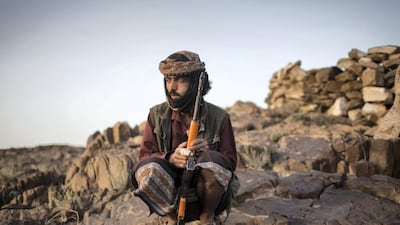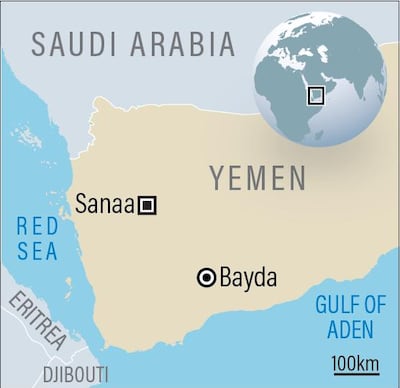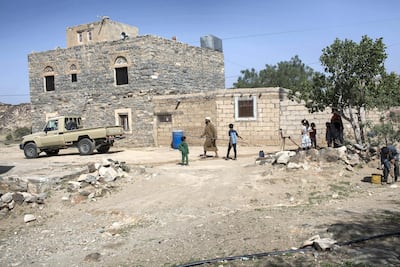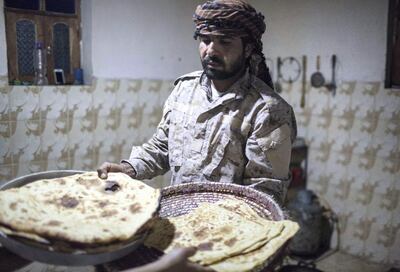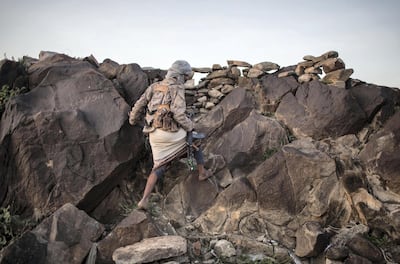Three years ago, Ahmed Omar lived in Saudi Arabia, employing men from his hometown of Bayda to paint houses in Makkah. Today he leads many of those same men in a battalion of fighters battling Houthi rebels on the hillsides of Zi Naem, south of Bayda.
It's a fight for their homes on a Yemen frontline that has received less attention than the ongoing military operation to retake Hodeidah, Yemen's largest port city. But Mr Omar, a lean 33-year-old says that Bayda's proximity to the rebel-held capital means it could be their turn to advance next.
“Bayda is after Hodeidah,” he says. “It’s a key governorate for reaching Sanaa.”
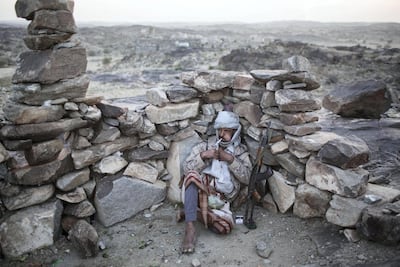
After seizing control of Yemen’s capital Sanaa in 2015, Houthi forces pushing southwards overran Bayda, a sparsely populated province in central Yemen. Today the Houthis control the regional capital Bayda and about 80 per cent of the rest of the province.
Local men of the Al Omar tribe took up arms against the Houthis under the leadership of Muhamed Salih Abdul Rabb Al Ghoneimi and his deputy Mr Omar. The 180 men of the Abu Jabr Brigade take their name from Mr Al Ghoneimi’s nom de guerre.
“All the front lines fighters are men from around the area, we’re one tribe, everyone came to fight for his religion and his land,” said one of Abu Jabr’s skinny young gunmen on the frontline.
Renowned as fighters, there were originally 280 in the brigade but 60 have been killed and others are injured or on leave.
For Mr Omar and the Abu Jabr Brigade, the war is local and personal. The reason they sided with the government against the Houthi is a grievance that dates back decades. In 1962, Bayda tribesmen fought for the Yemen Arab Republic against Zaydi tribes. “It’s an old revenge story between Houthis and tribesmen in Bayda,” says Abdel Al Qadir Al Rassas, a tribal sheikh from Bayda.
The men live with their families near the lines. Mohamed Abu Rayouf is typical. One of Mr Omar’s former painters in Saudi Arabia who returned home to join the fight, the 35-year-old has his three daughters with him and twice a day his wife bakes bread and prepares food twice a 15 fighters and their extended family members. “I know all the fighters,” says his wife, who adds that most of them are either related or former neighbours. “At first it was difficult when my husband was away at the frontline every night, but I got used to it.”
The fighters are all volunteers, but others from the tribe still live in Saudi Arabia and their remittances support the brigade.
The frontline in Bayda consists of defensive sandbagged positions running along hillsides around a string of tiny villages – Yaf’an, Durei’a and Al Zahir. The men look out over Houthi lines 600 metres away. Between them lie minefields planted by the Houthi and the men say it’s a lack of weaponry preventing them from making their advance.
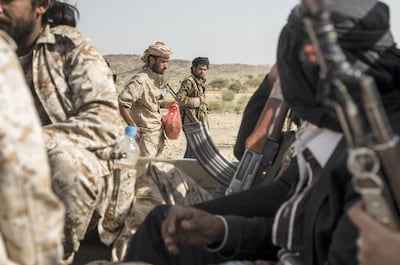
Several times in the past few years the Abu Jabr fighters have travelled to other frontlines to take part in other battlefronts. Bab Al Mandab in 2015, Mocha last year, and this year the group fought to free Al Khokha south of Hodeidah, Mr Omar says.During fierce fighting, his men captured a Houthi tank and a cache of rockets.
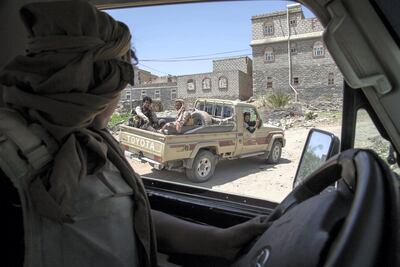
Mr Omar stressed the importance of Bayda. “It’s a key central province.”
His frontline is three kilometres from the Houthi-controlled highway which connects Bayda to Sanaa. “If we cut this road we’d stop the Houthis resupplying Bayda and we would be automatically freed from them.”
Some tribesmen have reportedly aligned with Al Qaeda in the Arabian Peninsula, which has a foothold in Bayda.
But Mr Omar says the Abu Jabr brigade doesn’t welcome outsiders. “We don’t take Al Qaeda. We just take volunteers who want to defend their lands.”
Sheikh Al Rassas said further support was critical to overcoming both Houthi and Al Qaeda influence in Bayda. “The Emirates have given plenty to Mocha and fixed a lot of destroyed buildings," he said. "The Gulf countries – particularly Saudi Arabia and the Emirates – are like big brothers to us. Our main enemy is Iran which supports the Houthis.”
If a political solution to Yemen’s war is not forthcoming, Mr Omar believes the Bayda frontline could gain prominence. “Sanaa will never be freed except through Bayda,” he said. “It’s the victory gate.”
____________
Read more:
Local fighters in Hodeidah seek to break Houthi yoke
Houthi exit from Hodeidah non-negotiable says Gargash
Plans in place to isolate Houthi fighters in Hodeidah
____________
